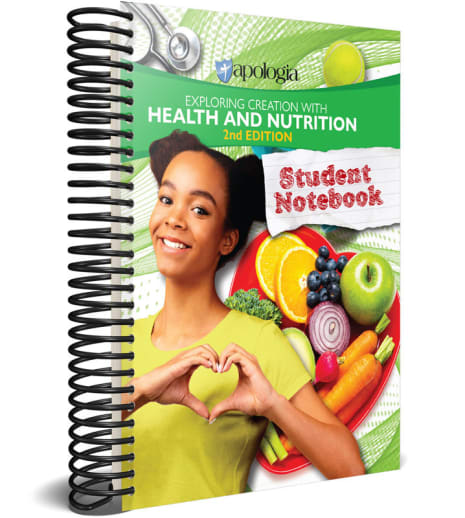Intended to accompany the Student Textbook, the spiral-bound and consumable Exploring Creation with Health and Nutrition Student Notebook by Apologia includes a suggested daily schedule, grading rubrics and recording charts, student note pages, space to answer the “On Your Own” questions, detailed project instructions, and chapter study guides. Projects are primarily research or personal assessment based. No lab kit is available, as the projects will not meet a high school science lab credit. Components are available separately or in a convenient set. Not reproducible.
Exploring Creation with Health and Nutrition Student Notebook (2nd Edition)
Product Overview
- The Apologia Health and Nutrition Student Notebook is a companion product to the Student Textbook
- Includes suggested daily lessons, projects, study guides, and tests
- Optional for an elective credit in Health and Nutrition but required for a state-mandated Health and Nutrition credit
Description
This high school health and nutrition curriculum explores the physical, social, mental, and spiritual concepts that are needed for a healthy lifestyle. With detailed illustrations and photos, clear explanations, and enhanced readability, Exploring Creation with Health and Nutrition, 2nd edition covers what maturing students need to know to help them make the best choices they can for themselves as they become young adults. With new and updated content, the 2nd edition continues to illuminate for students that health is about stewardship: managing what you have as well as you can.
Looking for a solidly Christian-based and academically complete health and nutrition course for your high schooler? Apologia’s Exploring Creation with Health and Nutrition may be the perfect fit! Offering a wide range of topics related to health and nutrition, students learn basic anatomy and common health-related conditions, genetics, macro- and micro-nutrients, exercise, diet, and important mental and emotional health topics. Skills essential for emotional health are covered, including understanding your temperament, decision-making skills, boundaries, contentment, conflict resolution, communication skills, and more. There is also an introduction to various mental health issues and conditions including signs of and available treatments for depression, anxiety, dementia, and others. Reproductive anatomy and physiology are covered, with accurate illustrations and descriptions. Marriage, sexuality, pregnancy, and sexually transmitted diseases are discerningly explained, along with alcohol and drug abuse, pornography, and other topics necessary for our young people to understand for successful navigation in adulthood. This is handled gently and respectfully, but parents should evaluate their young adult’s emotional and spiritual maturity prior to starting the lessons. Students are also introduced to an array of health-related careers.
Components include the softcover Textbook and the Student Notebook. At the high school level, there are two paths for transcript credit. For the elective credit, students would minimally need to read the textbook then answer the “On Your Own” questions found in the textbook. The Student Notebook is technically optional. However, to meet a state-required Health and Nutrition credit, students will need the textbook along with the Student Notebook, which contains additional course learning activities. Both paths require internet access (parent supervision suggested) and basic exercise equipment (fitness ball, athletic shoes, cushioned floor). Purchase of the course includes access to a website and password for “Book Extras” to enhance the course.
If you are familiar with the first edition course, the table of contents and coverage remains the same, but several changes were made. Numerous quotes and “Think About This” sections have been revised or removed. Project 7.3 was removed. Information has been expanded for some topics, including mental illness, emotional health, and gender identity. Like other Apologia upper-level science courses, this is designed to be independently completed. This one-year course will meet your transcript needs for a nutrition credit and provide many of the skills for a successful transition to adulthood. ~ Deanne
| Product Format: | Paperback |
|---|---|
| Grades: | 9-12 |
| Brand: | Apologia |
| ISBN: | 9781946506870 |
| Length in Inches: | 10.875 |
| Width in Inches: | 9.25 |
| Height in Inches: | 1.3125 |
| Weight in Pounds: | 2.55 |

